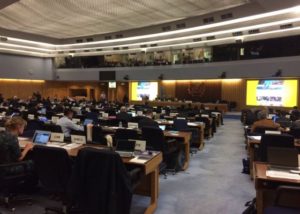EU support for a CO2 emissions reduction target for the shipping sector as well as potential short, mid, and long-term reduction measures has been backed by the European Sea Ports Organisation (ESPO).

The reduction target and measures being discussed are for inclusion in the International Maritime Organization’s (MEPC 72) Initial GHG Strategy, which is anticipated to be adopted this month. Once adopted, it will be the contribution of the shipping sector to the Paris Agreement and together with all other national reduction commitments, it will be tested whether it is fit for purpose at the “stock-taking” meeting planned later this year.
Timely action
ESPO’s Secretary General, Isabelle Ryckbost, said: “The Initial GHG Strategy will allow shipping to take part in the stock-taking meeting under the Paris Agreement in 2018. We need global action but we need it on time. There is a sense of urgency in order for the sector to contribute to the Paris objective to keep the increase of global temperature well below two degrees.
“We hope that the EU position will be well received and will be considered by the negotiators as a constructive contribution to finalizing and adopting the Initial IMO GHG Strategy next week. It is good to see that it is already receiving some support on the shipping side as well.”
The EU and national climate measures that are currently being developed to implement the Paris Agreement oblige ports to reduce the carbon footprint of their land-based activities. In parallel, European ports aim to facilitate the decarbonisation of shipping by providing green services, where possible. Under the EU Alternative Fuels Infrastructure Directive, LNG bunkering facilities and On-shore Power Supply should be provided in ports of the TEN-T core network by 2025.
Source: Port Strategy

